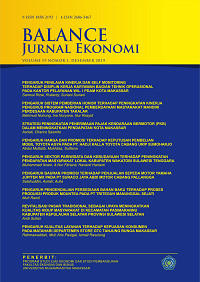EFFECT OF WORK LIFE BALANCE AND COMPENSATION ON JOB SATISFACTION AT KOPERASI SETIA BHAKTI WANITA SURABAYA
DOI: https://doi.org/10.26618/jeb.v17i2.6115
Work-Life Balance, Compensation, Job Satisfaction
Abstract
Human resources are an important resource in a company because human resources determine the success of an organization, both institutions, and companies. Therefore, companies need to pay attention to work-life balance and employee compensation properly so that employee job satisfaction in the company continues to increase. This study aims to determine the effect of work-life balance and compensation on employee job satisfaction at the Women's Cooperative Setia Bhakti Wanita Surabaya. The research method used is a quantitative method and data collection using a questionnaire using a five-point Likert scale as a measuring tool. The population and samples used in this study were all permanent employees at the Setia Bhakti Wanita Surabaya Cooperative with a total of 40 employees. The data used are primary data and secondary data while the analysis used is Partial Least Square (PLS). Based on the results of research that has been done: 1). Work-Life Balance that can be managed properly can also have a good influence on employee job satisfaction at the Setia Bhakti Wanita Cooperative of Women Surabaya 2). Good compensation has a good influence on employee job satisfaction at the Setia Bhakti Wanita Surabaya Cooperative.
References
Asepta, U. Y., & Maruno, S. H. P. (2017). Analisis Pengaruh Work-Life Balance Dan Pengembangan Karir Terhadap Kepuasan Kerja Karyawan Pt.Telkomsel, Tbk Branch Malang. Jurnal Ilmiah Bisnis Dan Ekonomi Asia, 11(2), 77–85.
Dian Intan Tangkeallo. (2018). Pengaruh Work Life Balance Dan Kompensasi Terhadap Kepuasan Kerja Dan Kinerja Karyawan Pada RSUD Lakipadada Tana Toraja. CAM JOURNAL : Change Agent For Management Journal, 2(2), 200–213.
Farisi, S. (2020). Pengaruh Stress Kerja Dan Kompensasi Terhadap Kepuasan Kerja Pada Dinas Pendidikan Kota Medan. Seminar of Social Sciences Engineering & Humaniora, 29–42.
Handoko, T. (2001). Manajemen Personalia dan Sumberdaya Manusia. Penerbit BPFE.
Hasibuan. (2016). Manajemen Sumber Daya Manusia. PT.Bumi Aksara.
Hasibuan, M. S. . (2003). Manajemen Sumber Daya Manusia, cetakan ketujuh. PT.Bumi Aksara.
Hasibun. (2009). Manajemen: Dasar, Pengertian, dan Masalah Edisi Revisi. Bumi Aksara.
Lockwood, N. R. (2003). Work/Life Balance: Challenges and Solutions. Research Quaterly, 1–10.
Parkes, L.P., & Langford, P. . (2008). Work-Life Balance or Work-Life Alignment? A Test of The Importance of Work-life Balance For Employee Engagement and Intention To Stay In Organisations. Journal of Management & Organization, 14, 267-284.
Qodrizana, D. L., & Musadieq, M. Al. (2018). Pengaruh Work-Life Balance Terhadap Kepuasan Kerja (Studi Pada Karyawan Perempuan Yayasan Insan Permata Tunggulwulung Kota Malang). Jurnal Administrasi Bisnis, 60(1), 11.
Simamora. (2004). Manajemen Sumber Daya Manusia. STIE YKPN.
Sugiyono. (2013). Metode Penelitian Pendidikan Pendekatan Kuantitatif, Kualitatif, dan R&D. Alfabeta.













